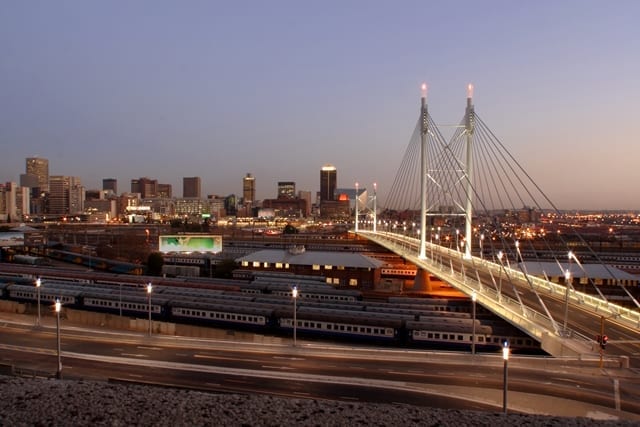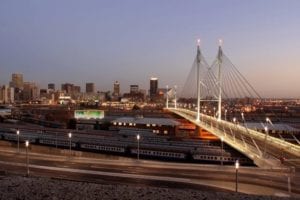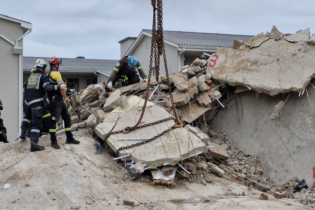
Investment in state-of-the-art infrastructure is not a luxury, but a necessity, said Gauteng Premier David Makhura at the Infrastructure Funding Summit held in Midrand on Thursday.
Makhura believes this form of investment will give citizens the opportunity to enjoy a good quality of life, and also allow industries to be globally competitive and to continuously modernise.
“More specifically, infrastructure investment contributes directly to economic growth in general and job creation in specific communities where the infrastructure is being built,” Makhura said.
The Summit was aimed at attracting investments for social infrastructure development and maintenance for the Gauteng City Region and Gauteng Province as a whole.
Makhura said that over the next three years provincial government plans to spend R46 billion on infrastructure. He said this would contribute significantly to economic empowerment, radical economic transformation, improving the quality of life of citizens and enhancing the global competitiveness of the Gauteng City Region.
Increased infrastructure investment
He emphasised that increasing infrastructure funding was not only for human settlements, but was also for other infrastructure including the public transport and industrial sectors which will be used to develop new industrial nodes.
He said his office would also look at raising funding for water and energy infrastructure, “because without adequate provision for water and energy, we can’t regard ourselves as a province at the cutting edge of development in the continent”.
He explained that provincial government’s goal was to build Gauteng into an integrated, economically inclusive, socially cohesive and globally competitive city, so it could earn the status of being a leading economic hub with world class infrastructure.
He added that this would be achieved through the ten-pillar programme for Transformation, Modernisation and Re-industrialisation (TMR).
R30 billion spent on infrastructure developments
Between 2013 and 2016, R30 billion was spent on infrastructure developments in Gauteng. This excludes municipal spending.
This infrastructure development resulted in:
- The creation of 92 000 direct jobs;
- R15 billion went directly to household incomes;
- Stimulated additional economic activity in the Gauteng economy worth R26 billion;
- Added R6 billion to government revenue;
- Every R1 spent on infrastructure, added 92 cents to the Gauteng economy; and
- 91% of infrastructure spend was on empowering historically disadvantaged individuals (HDIs).
R1.8 trillion required for infrastructure needs
Makhura said the Gauteng Infrastructure Master Plan has estimated that the province needs R1.8 trillion in investments to meet its infrastructure needs over the next decade and half.
“The government fiscus will never be enough in helping us to meet the growing infrastructure needs of this dynamic province,” he said. “It is for this reason that we look to the private sector and state owned companies to help us reshape the spatial economy of the Gauteng City Region.
“Private sector is 80% of South African economy, and we value private sector partnership,” he added.
Housing
Makhura also touched on housing units and said the province should aim to build between 10,000 to 30,000 housing units, not less than 10,000.
He said while the province has the best record of delivering 1.2 million houses since 1994, it has a stubborn and persistent backlog of about 600,000 houses, due to the high rate of urbanisation and in-migration.
“We can’t address this moving and shifting backlog through the delivery of smaller numbers,” he said. “We need mega developments that will deliver larger numbers. Scale is an important imperative: anything less than 10,000 units should not qualify as a mega human settlement project.”
Gauteng takes 30% of Human Settlements’ national budget
Director-general of the national department of human settlements, Mbulelo Tshangana, said cities have become the repositories of knowledge and agencies of social radical economic change.
“We are not there yet and we are not far from realising that goal,” he said. “The key message is how we adopt and forward plan in our cities.”
He noted that the budget for human settlements in Gauteng was over R5.5 billion and that the national human settlements budget was R18 billion. This means that Gauteng is taking almost 30% of the national human settlements’ budget.
“The Urban Human Settlements Development Grant is R12 billion countrywide, and R5.5 billion of that goes to the three metros in Gauteng, which is more than 40%,” Tshangana said. “This grant has to perform. If you combine the two, we have on an annual basis more than R10 billion earmarked for Gauteng.”
He explained that should the grant perform, it would help the province attract greater private sector investments, buy bulk infrastructure and land requisition, and buy and commit subsidies.
“If you partner with the private sector, you need to create certainty, you need to tell them what you are going to do over the next five to 20 years,” he said.
Gauteng human settlements MEC Paul Mashatile said the province must be able to invest in a smart way and create opportunities to stimulate local economic development and support small, medium and micro enterprise businesses (SMMEs).
“There’s growing business activity in the townships,” Mashatile said. “Beyond this summit, we will start holding capital bilateral roadshows which will focus on investment and domestic markets. Although there are resources, we need to leverage private sector funding in what we want to achieve.”








